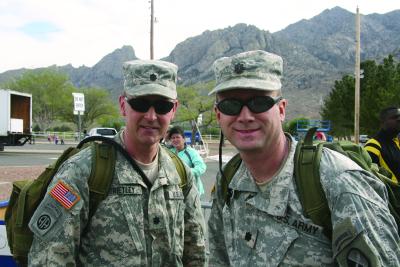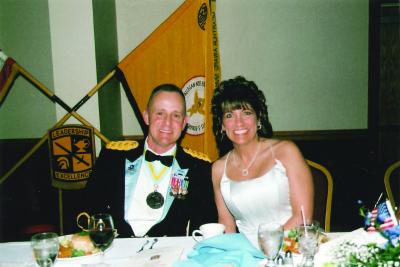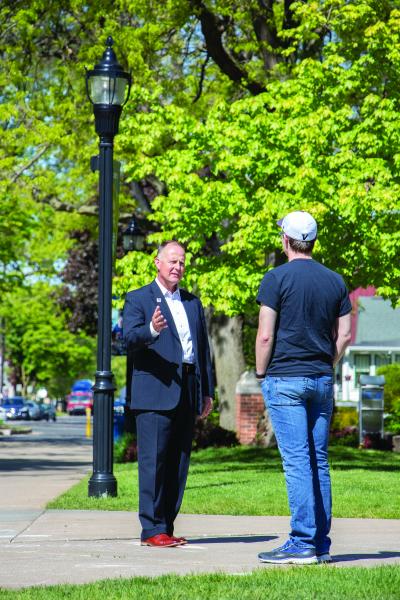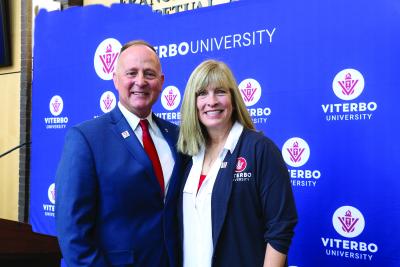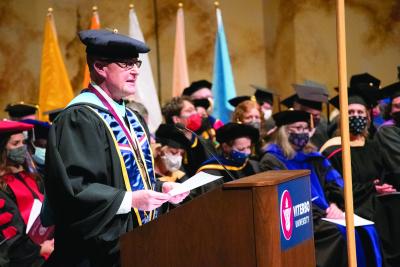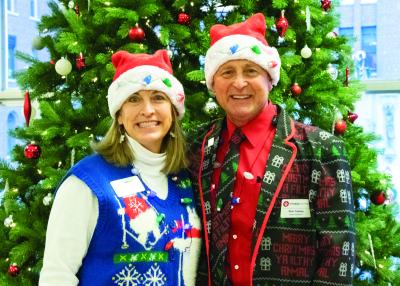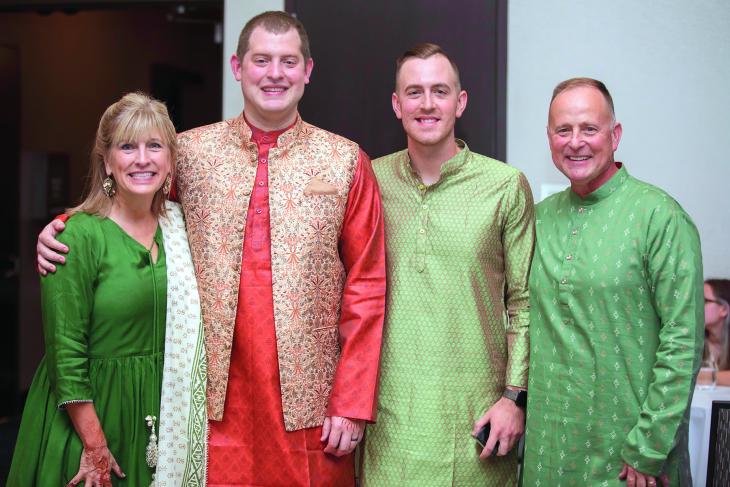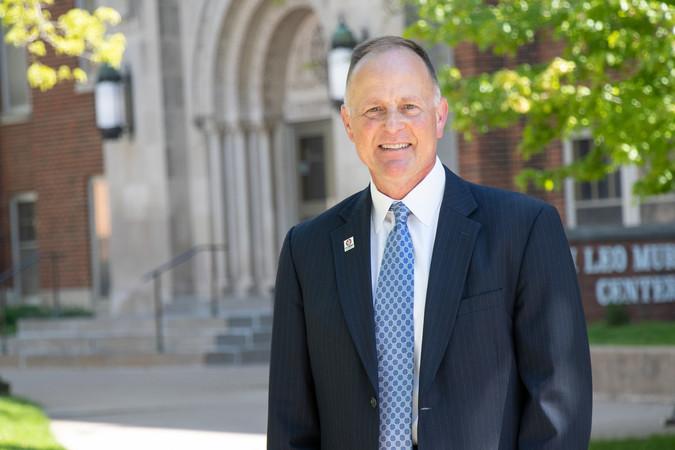
Two Apache gunships led the way for the helicopter carrying U.S. Army Lt. Colonel Rick Trietley and the other command and control officers back from a successful mission in Kandahar Province, Afghanistan. As the formation flew over a series of homes, a roof suddenly flipped open to reveal a large machine gun that immediately began to fire at the close and often lethal range of 250 feet. The Taliban members manning the gun had allowed the escorting gunships to pass by to target the command helicopter. “It was only by the grace of God we weren’t hit,” Trietley said. “The pilot took evasive action, and then everything seemed to happen in slow motion. I could see everything clearly. There are moments in combat on which you reflect later when the adrenaline has worn off and you don’t know how you made it out. That was one.”
For this harrowing moment in 2003 and other instances of grave danger in a combat zone at the height of the War on Terror, Trietley would be one of the very few infantrymen to be awarded the Air Medal, which is almost exclusively given to pilots and air crews. He would also receive the Bronze Star Medal for meritorious service and other honors resulting from his combat deployment. In Afghanistan, he served as Brigade Executive Officer of 1st Brigade, 82nd Airborne Division and was second-in-charge of 3,200 soldiers.
Trietley would bring leadership skills honed during battle and the rest of a stellar 22-year career in the military and a nine-year post-military position at St. Bonaventure University to Viterbo in 2017. Named vice president for student affairs and promoted three times in five years, Trietley was named the 10th President of Viterbo University during a campus ceremony Feb. 10.
“It is truly an honor and privilege to be the president of Viterbo University,” Trietley said. “The opportunity to lead the university into the next phase of its proud history is both exciting and humbling. Through a steadfast focus on ethical leadership, faithful service, and our time-tested core values, Viterbo will continue the legacy of the Franciscan Sisters of Perpetual Adoration who came before us and set such an inspiring example.”
Trietley’s journey to the presidency of Viterbo University humbly began as one of four sons of working-class parents in the blue-collar town of Olean, N.Y.
Located just three miles down the road happened to be St. Bonaventure University. The school was a key part of the community, providing jobs, programs, and events, Division I athletics, and a broad moral compass. In elementary school, Trietley looked up to the many students he would often see around his community. Enrolling in a “Big Brothers, Big Sisters” program, he was assigned a student at St. Bonaventure. This person would quickly become a friend, role model, and mentor as they spent a few hours each week on campus talking, playing sports, eating, and studying.
“I loved everything about the campus environment and the people I met,” Trietley said. “Spending time there lit a fire in me, and I knew that attending college and earning a degree was my ticket to a better future.”
A would-be first-generation college student, Trietley was unsure how to make this happen. He would find the answer in the form of a U.S. Army ROTC scholarship at St. Bonaventure. Early in his freshman year in the fall of 1982, he would form life-long friendships with fellow cadets John Santini, Jim Mis, and Tony Dubin.
“You could tell early on that leadership positions came naturally to Rick, so his later being named the president of a university wasn’t a surprise at all,” Santini said. “His leadership skills, competence, calm demeanor, his willingness to consider all viewpoints before deciding on a course of action, and the innate ability to make others feel welcome and at ease will serve any organization well. Viterbo is incredibly lucky to have him.”
Trietley would graduate from St. Bonaventure in 1986 with a bachelor’s degree in elementary education and as a “Distinguished Military Graduate,” designating him in the top 20% of graduating cadets nationwide. As his active-duty military career began, he was accepted into Ranger School, which included a grueling 63 days averaging two hours of sleep, one meal a day, and rigorous training in the Everglades, mountains, and desert. Trietley was one of less than half of soldiers who complete the course and earn the title of U.S. Army Ranger.
“Once I made the decision to be an infantry officer, I wanted the best training in the world so that I would always be prepared to lead,” said Trietley, who was assigned to the 82nd Airborne Division. “I also wanted to challenge and find out about myself.”
In 2003, his 17th year in the U.S. Army, Trietley and his unit went into combat.
“Combat is a life changing experience,” he said. “You ask yourself if you’re ready and if you’re worthy to lead these men. You rely on what you’ve been taught and your instinct. I saw our soldiers killed and wounded and the impact of war on the local children. But I treasured being part of something so important. Nine out of ten of our missions were humanitarian efforts, and I saw the positive difference we made in the lives of the people. I’ll always be proud of that. I did experience some PTSD and guilt about why I made it back and others didn’t, but I’ve been fortunate to use my life experiences to move forward and find peace.”
Trietley would have almost certainly continued to advance up the hierarchy of Army rank and leadership, but to the surprise of many friends and fellow officers, he declined a premier command of a tactical infantry battalion to accept a post as professor of military science at St. Bonaventure University. It meant the beginning of the transition to civilian life.
“There comes a time in every officer’s career when you need to balance the needs of your family and look for your next career,” he said. “The day-to-day pressures were less and it allowed me to spend more time with my wife and children.”
Trietley’s direction of the ROTC program was so successful he was asked by the president of St. Bonaventure to apply for an administrative position at the university. He would serve nine years as the vice president for student affairs, the same post he accepted at Viterbo in 2017. He went on to serve as interim provost and executive vice president for student success before assuming the interim president position. He has earned a master’s degree in teaching from Webster University and a Doctor of Education in Higher Education Leadership from Maryville University in St. Louis.
Teamwork, having a common goal and purpose, ethical decision making, sacrificing for the good of others, communication skills, and the ability to inspire trust and confidence in others are all key aspects of military leadership that were key to his personal development and will serve he and the university well during his tenure as Viterbo president, he said.
“Higher education has brought me a great deal of joy and satisfaction,” Trietley said. “Being around younger people who are excited about their futures makes you younger. These students can’t wait to go out and get a great job and make a difference in the world. We have the opportunity to act as mentors and help guide. Schools like Viterbo do that very well, and I am excited to come to work every day.”
Sara Cook, Viterbo’s vice president for academics, has worked closely with Trietley during his five years at the university. Their response to the COVID-19 pandemic was particularly important to the lives and success of students.
“Now it’s more important than ever for us to reconnect as a community, and Rick’s humility, generosity, and genuine concern for others make him a natural ‘connector,’” Cook said. “He has demonstrated success in making and strengthening relationships with external stakeholders, and he is dedicated to building social solidarity within our institution that will drive engagement and success. Rick understands our students and has truly taken the time to get to know our academic programs and faculty. His particular pathway through both student affairs and academic roles in higher ed and his commitment to our mission and student success provide such a solid foundation for his presidency. I appreciate Rick’s consistent, centered, servant leadership style and his good humor as a colleague. Rick’s genuine enthusiasm and vision for the future of Viterbo and the impact we will make on our students and community are clear.”
The presidency of Viterbo University will in all likelihood be the last professional post for Trietley, 57. “I am all-in to see what the Viterbo community can accomplish together,” Trietley said. “Students will always remain the focus of everything we do here.”
One of those students, Maya Roberts, got to know Trietley very well during her time at Viterbo. Roberts was a first-year volleyball standout in 2017 when she and her teammates were in Sioux City, Iowa to compete for a NAIA national championship. They had taken the day before play began to work a hat and coat drive at the local Goodwill as part of the team’s commitment to community service. Two unexpected guests there to help soon joined them—Vice President for Student Affairs Rick Trietley and his wife, Michele. The couple would later join the team for dinner.
“You know, that was a very Viterbo thing to have happened,” Roberts said she thought to herself at the time. “It was a neat experience.”
Roberts and Trietley often interacted during the coming years as the Trietleys were “phenomenal supporters of athletics” and Roberts was involved with the Student Athletics Advisory Committee and numerous other initiatives on campus.
“I always found Rick to be very grounded in the Viterbo values of hospitality and support for the students,” said Roberts, who graduated in 2021 and is continuing her studies in the servant leadership graduate program. “He is truly interested in student success and student growth, and it has been fun to interact with him as he has grown in these roles at the university.”
Roberts was pleased with the news that Trietley had been named president.
“I was very excited for him, his family, and for the future of the university,” Roberts said. “Rick will be a very steady presence for the university who will take the time to know and understand the needs of the campus community and develop initiatives and programs to address them. His values though are what have me the most confident.”
